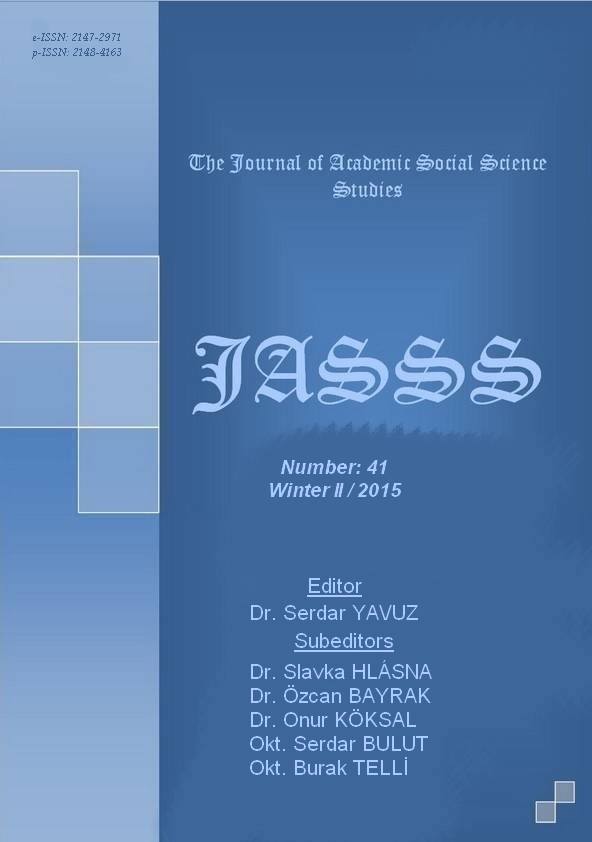AİLELERİN, ÇOCUKLARIYLA GERÇEKLEŞTİRDİKLERİ OKURYAZARLIK UYGULAMALARI ARASINDAKİ FARKLILIKLARI BELİRLEME
Author :
Abstract
Bu araştırmanın amacı, ebeveynlerin sosyoekonomik statülerine (SES) göre okul öncesi dönemdeki çocuklarının okuryazarlık becerilerini desteklemek için kullandıkları okuryazarlık uygulamalarının tür ve sıklıklarının farklılaşıp farklılaşmadığını belirlemektir. Örneklem grubunu Tekirdağ İli Süleymanpaşa (Merkez) ilçesinde alt sosyoekonomik statüdeki ebeveynlerin çocuklarının öğrenim gördüğü dezavantajlı bölgelerde bulunan beş ilkokul bünyesindeki anasınıfından 125 ve üst sosyoekonomik statüdeki ebeveynlerin çocuklarının öğrenim gördüğü dört özel anaokulundaki 125 öğrenci ebeveyni olmak üzere toplam 250 ebeveyn oluşturmaktadır. Araştırmada ilişkisel tarama modeli kullanılmıştır. Araştırmanın verileri, Saracho (2000) tarafından geliştirilen ve Güleç (2010) tarafından Türkçe’ye uyarlanan Aile İçinde Okuryazarlık Gelişimi Ölçeği (FLQ) ile toplanmıştır. Ölçek, aile üyelerinin ev ortamında ve ev dışında çocukların okuryazarlık gelişimlerini desteklemek amacıyla kullandıkları okuryazarlık aktivitelerinin ve materyallerinin tür ve sıklığını belirlemek amacıyla ailelere uygulanmıştır. Ölçeğin başında ailelerin sosyoekonomik durumlarının saptanmasına yönelik olarak araştırmacı tarafından geliştirilen demografik bilgi formu bulunmaktadır. Araştırmadan elde edilen verilerin bilgisayar ortamına aktarılmasında ve analizinde SPSS 18.0 programı kullanılmıştır. Gruplar arası karşılaştırmalarda kategorik veriler için ki-kare testi kullanılmıştır. Çocukların okuryazarlık sürecinde ailelerinin sosyoekonomik düzeylerinin etkili olduğunu kanıtlamak üzere alt ve üst sosyoekonomik düzeyi temsil eden okul öncesi eğitim kurumlarındaki çocukların ailelerine yönelik olarak yürütülen bu çalışmanın sonuçları farklı sosyoekonomik düzeydeki ailelerin çocuklarına okuryazarlık anlamında sunduğu imkanların farklı olduğunu kanıtlamıştır. Araştırma sonuçlarına göre ebeveynlerin eğitim durumları ve mesleklerinin bileşimini oluşturan SES’e göre ailelerin kullandıkları okuryazarlık uygulamalarının tür ve sıklıklarının farklılaştığı ve bu farklılığın üst sosyoekonomik statüdeki aileler lehine anlamlı olduğu bulunmuştur.
Keywords
Abstract
The purpose of this study is to determine whether practices that they use to support children`s literacy skills at preschool period associated with socioeconomic statuses and materials` types and frequencies differentiate or not. Sample group consists of 250 parents from Süleymanpaşa district in Tekirdağ. 125 of these are in lower socioeconomic status, whose children studying at five different nursery classes included in the primary schools which are located in disadvantageous areas and the other 125 belong to higher socioeconomic status and their children study at four different private kindergarden schools. This study was conducted by descriptive and relational method. The data was gathered by The Family Literacy Questionnaire (FLQ) which was developed by Saracho (2000) and adapted into Turkish by Güleç (2010). The scale was applied to the parents with the purpose of specifying the types and the frequencies of the activities and materials which are used by families to support the progress of the children`s literacy skills at home and out. The scale starts with the demographical information form which was gathered by the researcher to define the families` socioeconomic conditions. The software called SPSS 18.0 was used in transferring and analyzing the acquired data. Also categorical data at intergroup comparisons were gathered by chi square test. The above mentioned study conducted to prove that children`s literacy process are affected by families` socioeconomic level. The results of this study intended for the parents of the children from preschools which are representing both the high and low socioeconomic levels aiming to demonstrate that children’s literacy processes are affected by their families’ socioeconomic level and it is proved that the opportunities for the literacy of the children change according to different socioeconomic levels. Following the searches according to SES which combines the parents` educational backgrounds and professions, the materials, activities and their frequency that parents use in children literacy process differ and it is resulted in favor of the parents in higher socioeconomic level.





